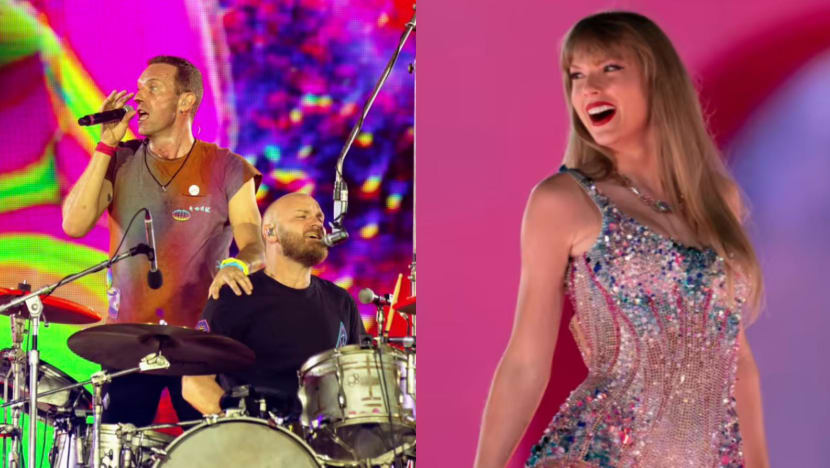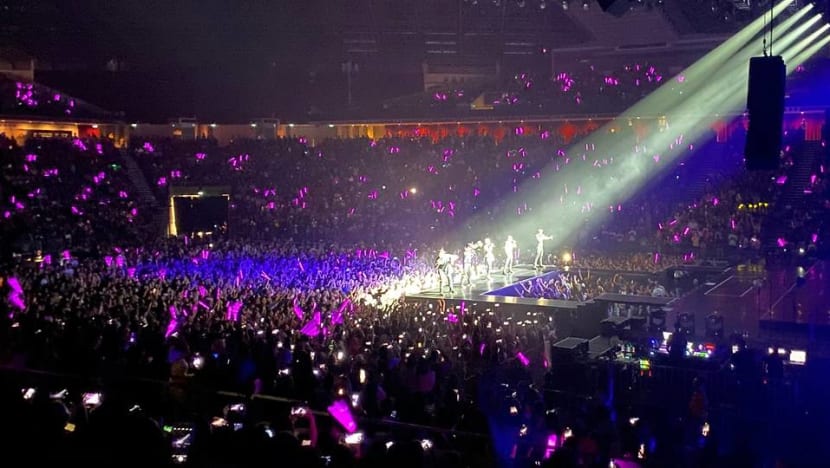World-class venues, positioning as regional events capital behind Singapore's concert hub status
Two hugely popular artistes – Coldplay and Taylor Swift – recently announced multi-day concert tours in Singapore. CNA looks at what attracts them here and how Singapore can sustain this momentum.

Coldplay and Taylor Swift in concert. (Photos: Suzan Moore/PA via AP, AP/George Walker IV)
SINGAPORE: Prominent artistes like Coldplay and Taylor Swift have chosen Singapore as a tour stop – and even playing multiple days – due to factors like the country’s state-of-the-art event facilities and its branding as an entertainment hub, tourism experts told CNA.
Easy connectivity to other Southeast Asian cities, stable governance and promotion efforts by the Singapore Tourism Board (STB) are also why Singapore has become a regional concert hub, they said.
On Tuesday, news broke that Coldplay will perform an unprecedented six Singapore shows for its upcoming Music Of The Spheres world tour in January.
The British rock band had originally announced four shows before adding two more due to “incredible demand”, having broken the record for the most tickets – more than 200,000 – sold in a single day in Singapore history.
On Wednesday, the Singapore Sports Hub announced that Swift will put on three shows at the National Stadium in March.
CONNECTIVITY TO NEARBY CITIES
Mr Kevin Wee, senior lecturer at Nanyang Polytechnic’s school of business management, pointed out that Singapore is “just a short hop away” for fans in the region and is well-connected by air to many countries.
“This prime location attracts artistes and turns music lovers into tourists, allowing them to soak in the city's other delights beyond concert time,” Mr Wee added.
“Easy connectivity to other Southeast Asian cities means fans can flock to Singapore for a thrilling performance and fly back home with more than just concert memories.”
“Stable governance, safety and security” such as crowd control and anti-terrorism protocols are also why Singapore is the preferred destination for big names, said World Women Tourism co-founder Barkathunnisha Abu Bakar.

Mr Christopher Khoo, managing director of tourism consultancy MasterConsult Services, said that musicians who venture to the Asia-Pacific region usually consider places like Japan or Australia. Those that want to tap the Southeast Asia market will turn to Singapore because it is “in the centre of the region”, he added.
Singapore has also positioned itself as an entertainment and nightlife capital in the region, attracting visitors from neighbouring countries like Malaysia, Indonesia and the Philippines, said Mr Khoo.
“Our accessibility to KL, to Malacca, to Bangkok, to Jakarta and all that means that they are able to consider Singapore as almost like a weekend getaway destination if there is a particularly good show or concert that they want to attend.”
Dr Michael Chiam, senior tourism lecturer at Ngee Ann Polytechnic, said these fans will then shop and dine here as well as visit some tourist attractions, which help to contribute to the economy.
Mr Khoo added that he was sure a “good percentage” of concert-goers in Singapore are tourists.
Singapore is Swift’s only stop in Asia apart from Japan, while Coldplay will also perform in Kuala Lumpur, Manila and Bangkok.
It is holding just one concert in Malaysia and has been met with opposition by Islamist party Parti Islam Se-Malaysia, among others, over alleged links with the lesbian, gay, bisexual and transgender community.
Mr Khoo noted there have been past issues in Malaysia and Indonesia in relation to concerts, such as how skimpily a performer can dress. “But generally, Singapore is seen to be a good or very safe venue for them to show their acts,” he added.
STB'S PROMOTION EFFORTS
Dr Barkathunnisha from World Women Tourism said the music and entertainment industry is part of the MICE (meetings, incentives, conferences and exhibitions) sector, with Singapore being a MICE centre in Southeast Asia.
“There are plenty of grants and incentives provided by STB to support the MICE sector, especially in the pandemic recovery phase,” she said.
“These initiatives have established Singapore’s brand as a global and regional hub for music and entertainment, enabled Singapore to tap the dynamic growth of music markets in the region and, also opened many opportunities for collaboration between our city-state and the stakeholders in the global music industry.”
Many global music companies have also set up shop in Singapore, such as Universal Music Group which established its Southeast Asia regional headquarters here, she added.
Elaborating on STB’s efforts, Dr Barkathunnisha said it has been developing strategic tie-ups in the region and even partnered with Grammy-nominated singer-songwriter Charlie Puth as well as record label Warner Music to promote Singapore as a music and entertainment destination.
STB also recently collaborated with Hong Kong-born K-pop star Jackson Wang, who recorded a series of travel vlogs in Singapore.
WORLD-CLASS INFRASTRUCTURE
In terms of facilities, Singapore has world-class infrastructure and state-of-the-art venues that are well-equipped to host large-scale concerts, said Dr Barkathunnisha.
Some examples are the Victoria Memorial Hall and Esplanade to “cater to different types of events or concerts”, Mr Khoo noted.
“The venues themselves are also vying for different acts … So that’s good,” he said. “We’ve created a little bit of an ecosystem there that tries its best to pull in K-pop artistes, Japanese artistes, or European or American artistes to come over to Singapore.”
While Singapore has been able to attract big names even before the pandemic, Mr Khoo pointed out that pent-up demand from COVID-19 restrictions could have led to an increase in demand for concerts, leading to artistes like Coldplay adding more performances in Singapore.

MOVING FORWARD
As for what Singapore can do to sustain the momentum, the experts said it is important to keep event facilities up to date and build on air connectivity.
“To keep the ball rolling, we cannot afford to rest easy,” Mr Wee from Nanyang Polytechnic said.
“Maintaining our top-notch standards is crucial, but there's room for growth, particularly in expanding flight connectivity with massive markets like China, home to a legion of potential ‘entertainment seekers’.”
Dr Barkathunnisha said Singapore can establish more partnerships and collaborations with renowned music promoters, event organisers and production companies specialising in international concerts, as well as do more in building the local music scene.
“By cultivating a diverse and vibrant music scene, the destination becomes more appealing to international artists who are interested in exploring new markets and collaborating with local musicians.”






















